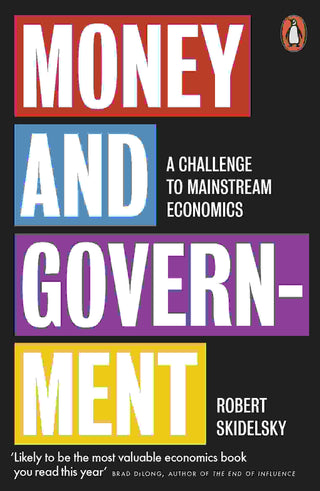Money and Government : A Challenge to Mainstream Economics
- Unit price
- / per
-
Author:SKIDELSKY Robert
-
ISBN:9780141988610
-
Publication Date:November 2019
-
Edition:1
-
Pages:512
-
Binding:Paperback
-
Publisher:Random House
-
Country of Publication:United Kingdom


A Back Order button means that we don’t have the book in stock at our store. It may already be on order – or we can order it for you from a publisher or distributor at no additional cost.
As we source items from around the globe, a back-order can take anywhere from 5 days to several weeks to arrive, depending on the title.
To check how long this might take, you’re welcome to contact us and we can provide an ETA or any other information you need. We recommend checking the timeframe before committing to an online order.
Money and Government : A Challenge to Mainstream Economics
- Unit price
- / per
-
Author:SKIDELSKY Robert
-
ISBN:9780141988610
-
Publication Date:November 2019
-
Edition:1
-
Pages:512
-
Binding:Paperback
-
Publisher:Random House
-
Country of Publication:United Kingdom
Description
The dominant view in economics is that money and government should play only a minor role in economic life. Money, it is claimed, is more than a medium of exchange; and economic outcomes are best left to the 'invisible hand' of the market.
Tracing the establishment of this orthodoxy and the challenges posed to it since the Great Depression of 1929-32, Robert Skidelsky shows how - unlike then - the 2008 global financial has not led to any new policy paradigm. Once the crisis had been overcome - by Keynesian measures taken in desperation - the pre-crash orthodoxy was reinstated, undermined but unbowed. No new 'big idea' has emerged, and orthodoxy has maintained its sway, enacting punishing austerity agendas that leave us with a still-anaemic global economy.
This book aims to familiarise the reader with essential elements of Keynes's 'big idea'. By showing that much of economic orthodoxy is far from being the hard science it claims to be, it aims to embolden the next generation of economists to break free from their conceptual prisons and afford money and government the starring roles in the economic drama that they deserve.
Adding product to your cart
You may also like
A Back Order button means that we don’t have the book in stock at our store. It may already be on order – or we can order it for you from a publisher or distributor at no additional cost.
As we source items from around the globe, a back-order can take anywhere from 5 days to several weeks to arrive, depending on the title.
To check how long this might take, you’re welcome to contact us and we can provide an ETA or any other information you need. We recommend checking the timeframe before committing to an online order.
You may also like
You may also like
-
The dominant view in economics is that money and government should play only a minor role in economic life. Money, it is claimed, is more than a medium of exchange; and economic outcomes are best left to the 'invisible hand' of the market.
Tracing the establishment of this orthodoxy and the challenges posed to it since the Great Depression of 1929-32, Robert Skidelsky shows how - unlike then - the 2008 global financial has not led to any new policy paradigm. Once the crisis had been overcome - by Keynesian measures taken in desperation - the pre-crash orthodoxy was reinstated, undermined but unbowed. No new 'big idea' has emerged, and orthodoxy has maintained its sway, enacting punishing austerity agendas that leave us with a still-anaemic global economy.
This book aims to familiarise the reader with essential elements of Keynes's 'big idea'. By showing that much of economic orthodoxy is far from being the hard science it claims to be, it aims to embolden the next generation of economists to break free from their conceptual prisons and afford money and government the starring roles in the economic drama that they deserve.
-
-
Author: SKIDELSKY RobertISBN: 9780141988610Publication Date: November 2019Edition: 1Pages: 512Binding: PaperbackPublisher: Random HouseCountry of Publication: United Kingdom
The dominant view in economics is that money and government should play only a minor role in economic life. Money, it is claimed, is more than a medium of exchange; and economic outcomes are best left to the 'invisible hand' of the market.
Tracing the establishment of this orthodoxy and the challenges posed to it since the Great Depression of 1929-32, Robert Skidelsky shows how - unlike then - the 2008 global financial has not led to any new policy paradigm. Once the crisis had been overcome - by Keynesian measures taken in desperation - the pre-crash orthodoxy was reinstated, undermined but unbowed. No new 'big idea' has emerged, and orthodoxy has maintained its sway, enacting punishing austerity agendas that leave us with a still-anaemic global economy.
This book aims to familiarise the reader with essential elements of Keynes's 'big idea'. By showing that much of economic orthodoxy is far from being the hard science it claims to be, it aims to embolden the next generation of economists to break free from their conceptual prisons and afford money and government the starring roles in the economic drama that they deserve.
-
Author: SKIDELSKY RobertISBN: 9780141988610Publication Date: November 2019Edition: 1Pages: 512Binding: PaperbackPublisher: Random HouseCountry of Publication: United Kingdom
-




